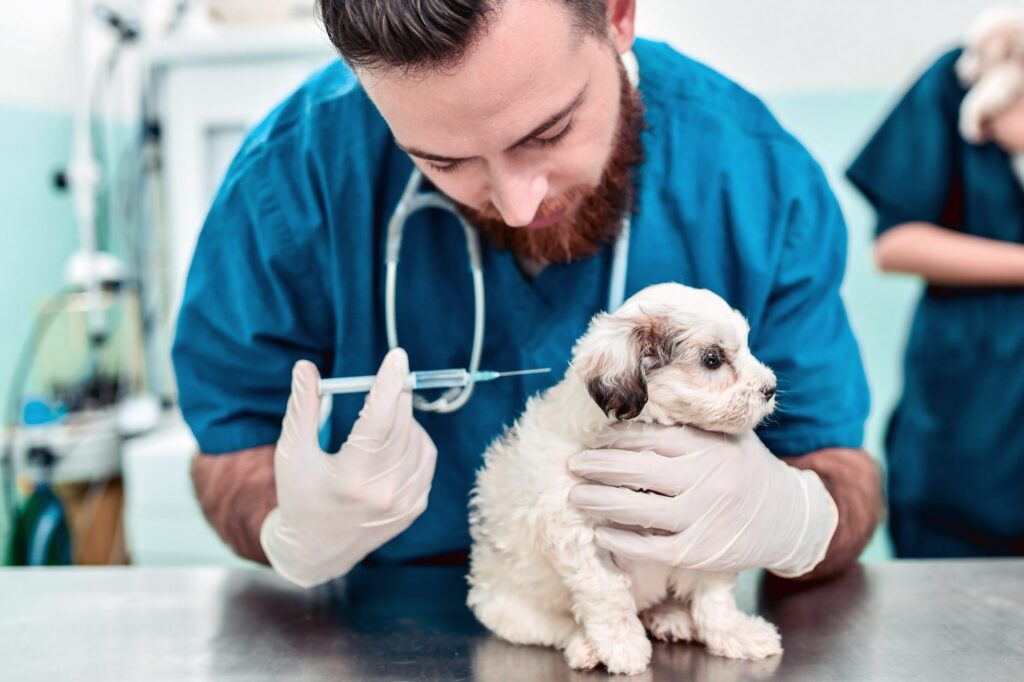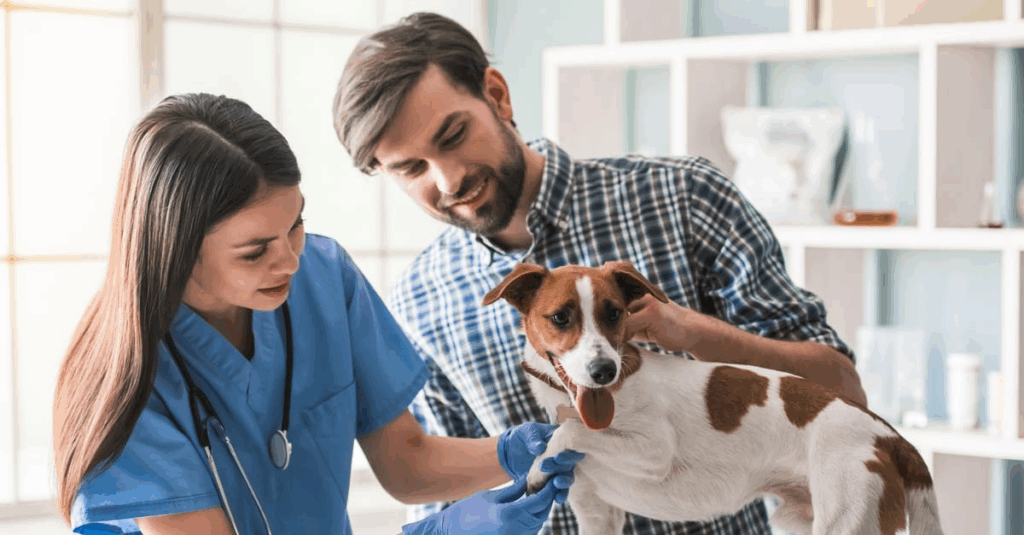Keeping your fur baby safe, happy, and healthy is undoubtedly the prime priority for any pet parent. When it comes to safeguarding the well-being of your tiny canine companion, understanding and adhering to small dog vaccination schedules is paramount. 💉🐾 This comprehensive guide titled ‘Protect Your Pup: The Ultimate Guide to Small Dog Vaccination Schedules for a Healthy and Happy Fur Baby’ is designed to provide you with all the information you need to navigate the world of canine immunization.

In this guide, we delve into the significance of timely vaccinations, which play a crucial role in bolstering your pet’s immunity, safeguarding them from potentially lethal diseases, and ensuring their optimal health. We will walk you through the typical vaccination schedules for small dogs, the types of vaccines they need, and the diseases they protect against. It’s an information-rich resource tailored to help pet parents make informed decisions about their little one’s health care needs.
Moreover, we will also explore the common myths and misconceptions associated with dog vaccinations, and shed light on the potential side effects and preventive measures to take. 🐶💕 By the end of this guide, you’ll have a clear understanding of the vaccination regimen for your small dog and will be well-equipped to ensure they lead a healthy and happy life. So, stay tuned to unravel the essentials of small dog vaccinations, because a little knowledge can make a world of difference in the life of your beloved fur baby.
Core vs. Non-Core Vaccinations
Vaccines for dogs are divided into two primary categories: core and non-core. Core vaccines are considered essential for all dogs regardless of their age, environment, or lifestyle. These include vaccines for highly contagious and potentially fatal diseases such as distemper, parvovirus, adenovirus (hepatitis), and rabies. They are the foundation of any vaccination protocol and are critical to public and animal health.
Non-core vaccines, on the other hand, are recommended based on a dog’s individual risk factors. These might include lifestyle, location, or exposure to other dogs. Examples of non-core vaccines include those for Bordetella bronchiseptica (kennel cough), Lyme disease, leptospirosis, and canine influenza. While not required for every dog, they can be very beneficial in specific scenarios — such as if your dog visits parks, attends daycare, or travels frequently.
Booster Shots and Long-Term Immunity
Some pet parents wonder why their dogs need booster shots after initial vaccinations. The answer lies in maintaining immunity. Over time, the antibody levels in your dog’s system can decline. Booster shots are timed to “remind” the immune system to stay alert and prepared. These boosters are particularly important in the early years and continue to provide protection throughout the dog’s life.
For adult dogs, boosters are often administered every one to three years depending on the vaccine type and manufacturer’s guidelines. Rabies vaccines, for instance, can be valid for up to three years, depending on local regulations. Regular boosters not only extend immunity but also keep your dog compliant with local laws, especially for rabies.
The Role of Titer Testing
Titer testing is an option for pet owners who want to assess their dog’s current immunity status before administering additional vaccines. A titer test measures the level of antibodies in the blood for specific diseases. If the titer is high enough, your vet might decide to delay a booster. This approach can be especially helpful for senior dogs or those with medical conditions that make frequent vaccination risky. However, titer testing is not a replacement for all vaccinations and should be done under veterinary guidance.
Myths and Misconceptions About Dog Vaccines
There are several persistent myths regarding dog vaccinations. Some believe that once a dog is vaccinated as a puppy, it never needs vaccines again. Others think vaccinations are harmful or cause long-term health issues. It’s important to rely on veterinary science and expert advice to separate facts from fear.
Vaccines are rigorously tested and monitored for safety. While mild side effects like temporary soreness or fatigue may occur, serious adverse reactions are rare. The risk of disease far outweighs the minimal risk of vaccination. Trusting your veterinarian’s recommendation is key to avoiding misinformation and ensuring your dog receives proper care.
Monitoring Your Pet Post-Vaccination
After your dog receives a vaccine, it’s normal to observe them for 24 to 48 hours. Most dogs continue their day as usual with no signs of discomfort. However, minor symptoms like tenderness at the injection site, mild fever, or temporary fatigue can occasionally occur.
In rare cases, more serious side effects like vomiting, diarrhea, facial swelling, or difficulty breathing may appear. These symptoms require immediate veterinary attention. Being aware of your dog’s normal behavior helps you detect anything unusual quickly.
Preparing for a Vet Visit
Preparing your small dog for a vet visit can make the vaccination process smoother. Bring your pet’s medical records, especially if you are visiting a new clinic. A calm, comfortable environment helps reduce stress. Use a secure carrier or harness, and consider bringing a favorite toy or blanket.
Feeding your dog a light meal beforehand can also help avoid stomach upset. Try to remain calm yourself — dogs pick up on our energy, and staying relaxed can help them stay calm too. Positive reinforcement with treats or praise goes a long way in building a stress-free vet experience.
Understanding Local Laws and Regulations
Every country or state may have its own laws regarding dog vaccinations, particularly for rabies. In many areas, rabies vaccination is legally required and must be administered by a licensed veterinarian. Failure to comply can result in fines or complications if your dog is involved in an incident.
Your vet will stay informed about the most up-to-date requirements and will help you maintain a valid vaccination certificate. This documentation is often necessary for dog daycare, boarding, travel, and grooming appointments.
Traveling with Your Small Dog
If you plan to travel domestically or internationally with your small dog, you must ensure their vaccinations are up to date. Most airlines and countries require proof of rabies vaccination, often within a specific timeframe before entry.
In some cases, additional vaccinations or health certificates may be necessary. Start planning early, ideally 30 to 60 days in advance. Your vet can help you prepare the necessary documents and administer any required vaccinations in time.
Vaccination and Socialization
Puppy vaccinations are closely tied to the early socialization period. It’s a delicate balance between protecting your puppy from illness and ensuring they are well-socialized during their formative weeks. Most vets recommend beginning socialization after the first round of vaccines, in safe environments such as puppy classes or controlled playdates with fully vaccinated dogs.
Delaying socialization can result in behavioral issues later in life, while too much exposure before vaccines take effect can pose health risks. Work closely with your vet to create a schedule that encourages both safety and social development.
Special Considerations for Small Dog Breeds
Small dogs, due to their size and sometimes more delicate constitutions, may require extra consideration when it comes to vaccinations. While the vaccine dose is the same across sizes, small breeds can occasionally exhibit stronger reactions. This doesn’t mean vaccines should be avoided — but it does reinforce the need for careful observation.
Some vets may choose to spread out vaccinations across multiple visits rather than administer multiple vaccines at once in small dogs. This helps minimize the likelihood of side effects and gives the dog’s immune system more time to respond appropriately.
Combining Preventative Measures
Vaccination is only one part of your small dog’s overall health plan. Parasite prevention, dental care, balanced nutrition, and regular exercise all play a role in long-term well-being. Fleas, ticks, and heartworms can all introduce harmful pathogens — many of which vaccines cannot prevent — so regular preventatives are essential.
A monthly health routine that includes checking your dog’s weight, inspecting their coat and teeth, and updating preventatives will help detect issues early. Together with vaccinations, these steps create a robust defense system for your small companion.
Building a Lifelong Healthcare Plan
As your small dog moves through different life stages — puppyhood, adulthood, and senior years — their health care needs evolve. Vaccination schedules, diet, exercise, and veterinary check-ups all require periodic adjustments.
Partnering with a trusted veterinarian ensures you stay informed and proactive. Routine health evaluations, including blood work and physical exams, allow for early detection of problems and help tailor a care plan that meets your dog’s changing needs.
Core vs. Non-Core Vaccinations
In the world of vaccinations, there are two major categories: core and non-core, similar to the essential and optional features in software. Core vaccines are vital for all dogs, irrespective of their breed, age, or location. These include vaccines for diseases like Distemper, Parvovirus, and Rabies. Non-core vaccines are given based on a dog’s exposure risk. These might include vaccines for diseases like Bordetella or Lyme disease.
Monitoring Your Pet Post Vaccination
After your dog receives a vaccine, it’s completely natural for them to feel a bit under the weather. The most common mild reactions include slight lethargy, reduced appetite, or soreness at the injection site. Providing a calm and quiet environment can help your pup rest and recover more comfortably. Limit strenuous activities and monitor their behavior closely for the next 24 to 48 hours.
Offer plenty of fresh water and a small, easily digestible meal if they’re not eating as much as usual. Avoid any additional stressors, such as long walks or visitors, and give them space to relax. Light petting and reassurance can go a long way in keeping your furry friend comfortable.
When to Contact Your Veterinarian
While mild symptoms are typically nothing to worry about, it’s important to know when to seek veterinary help. If your dog develops persistent vomiting, excessive swelling, facial puffiness, difficulty breathing, or collapses, contact your vet immediately. These signs may indicate an allergic reaction that requires prompt treatment.
Even if the symptoms seem mild but continue beyond 48 hours, it’s best to call your veterinarian for advice. Every dog reacts differently to vaccines, and your vet can determine whether further observation or treatment is needed.
Keeping a Post-Vaccine Health Log
Keeping a health log after each vaccination can help you detect patterns and inform your vet during future visits. Note the vaccine administered, time and date, and any symptoms observed afterward. This record can be especially helpful if your dog needs to receive multiple vaccines throughout their life. Over time, this data builds a helpful history that supports your pet’s personalized healthcare.
Let me know if you’d like a visual guide or HTML version of this for WordPress.
Regular Vet Check-ups
Just as regular updates and patches keep software running smoothly, regular vet check-ups are important for your pet’s health. These visits are crucial to ensure that your pet’s vaccination schedule is on track and they are protected from diseases. A vet can also identify any potential health issues early and take preventive measures.

The Role of a Balanced Diet and Exercise
While a proper vaccination schedule is essential, so is maintaining a balanced diet and regular exercise for your small dog. Just like the hardware that supports the software, the physical health of your pet is equally important for their overall well-being. It’s important to provide your dog with a diet that suits their breed, age, and size, along with regular physical activity.
In conclusion, maintaining a comprehensive vaccination schedule for your small dog, similar to keeping software updated and patched, is essential for their health and happiness. By following these guidelines, you can ensure your fur baby lives a long, healthy, and joyful life.
Conclusion
In summary, protecting your small dog from preventable diseases through timely and appropriate vaccinations is a crucial part of pet ownership. This ultimate guide to small dog vaccination schedules provides invaluable insights into maintaining the health and happiness of your fur baby.
Understanding the types of vaccines, the appropriate age for each vaccination, and the possible side effects is essential for proactive pet owners. The need to prioritize core vaccines like distemper, parvovirus, hepatitis, and rabies cannot be overemphasized, as these diseases can be deadly if not prevented.
Regular visits to the veterinarian and open discussions about your dog’s health and lifestyle are also key. This helps to determine the need for non-core vaccines like Bordetella, leptospirosis, or Lyme disease vaccines.
Ensuring your fur baby follows a vaccination schedule is an act of love, guaranteeing them a long, healthy, and happy life. Remember, each pup is unique and may require a slightly different vaccination plan. Always consult with your veterinarian and don’t hesitate to ask questions. After all, your little canine friend depends on you for their well-being.
The road to a healthy and happy fur baby begins with you. Make vaccinations a priority, and give your small dog the best chance at a vibrant life.



